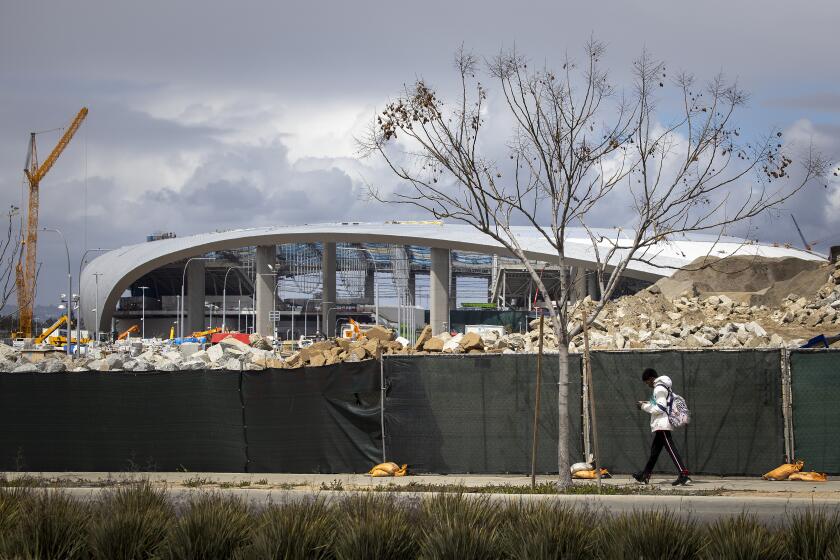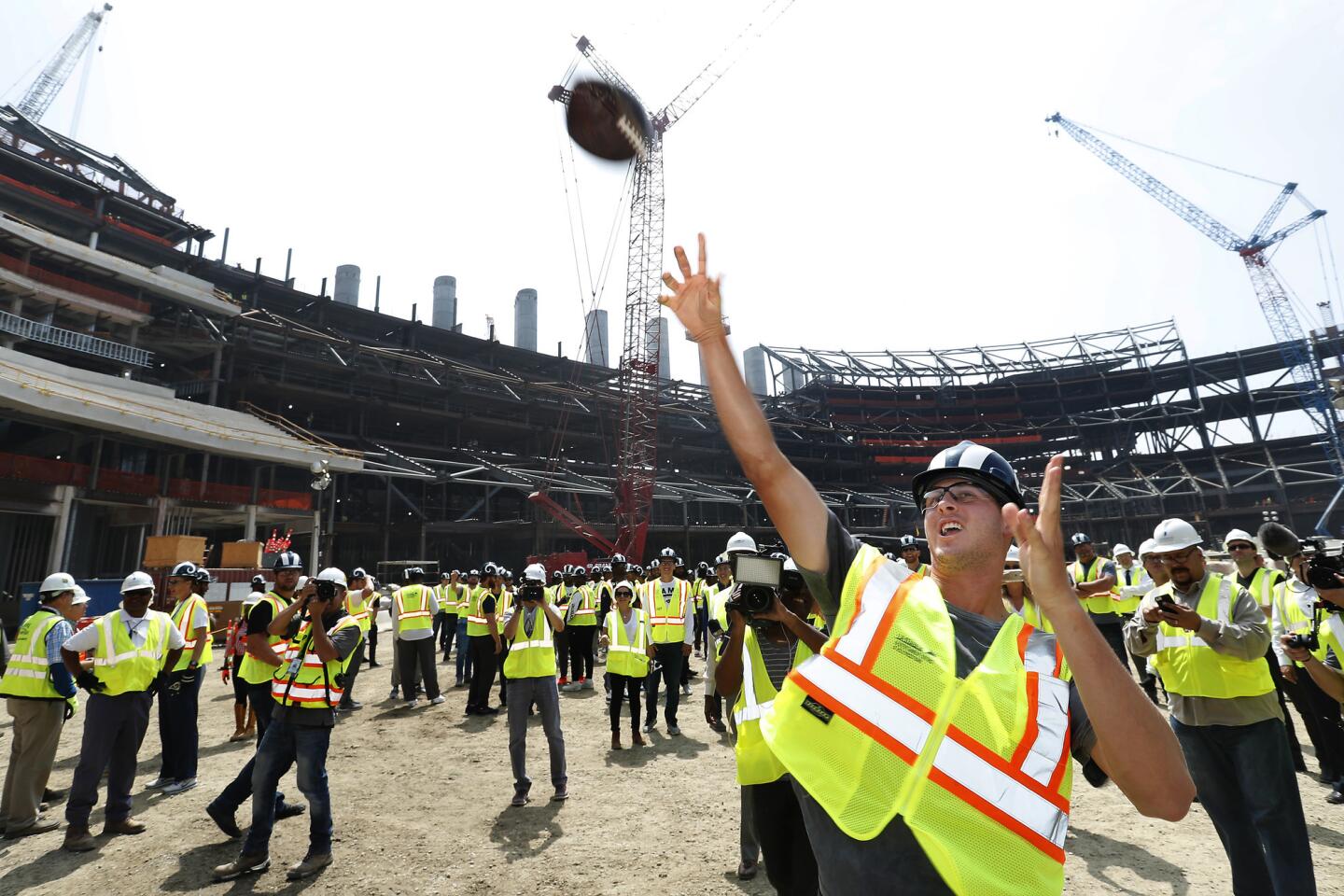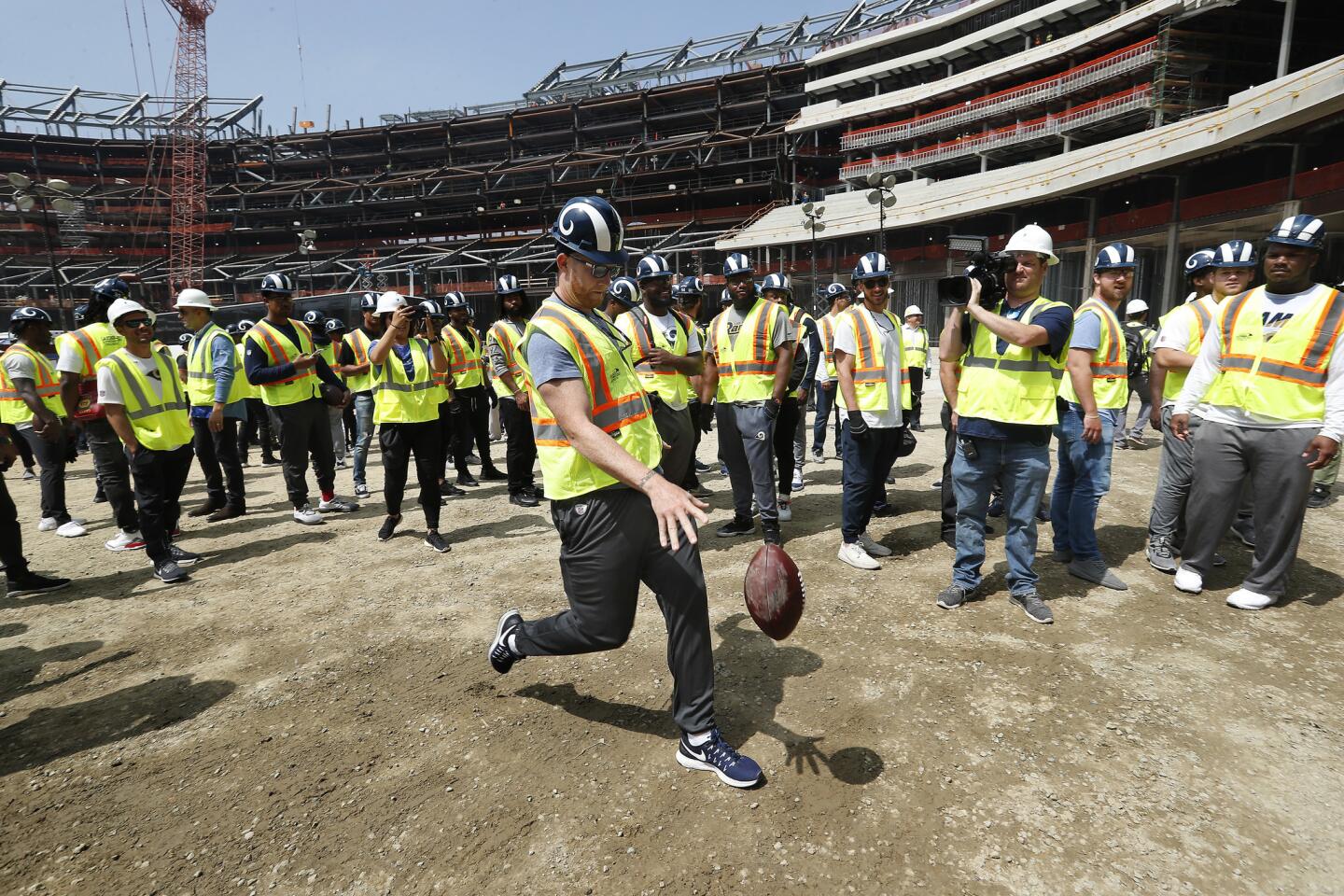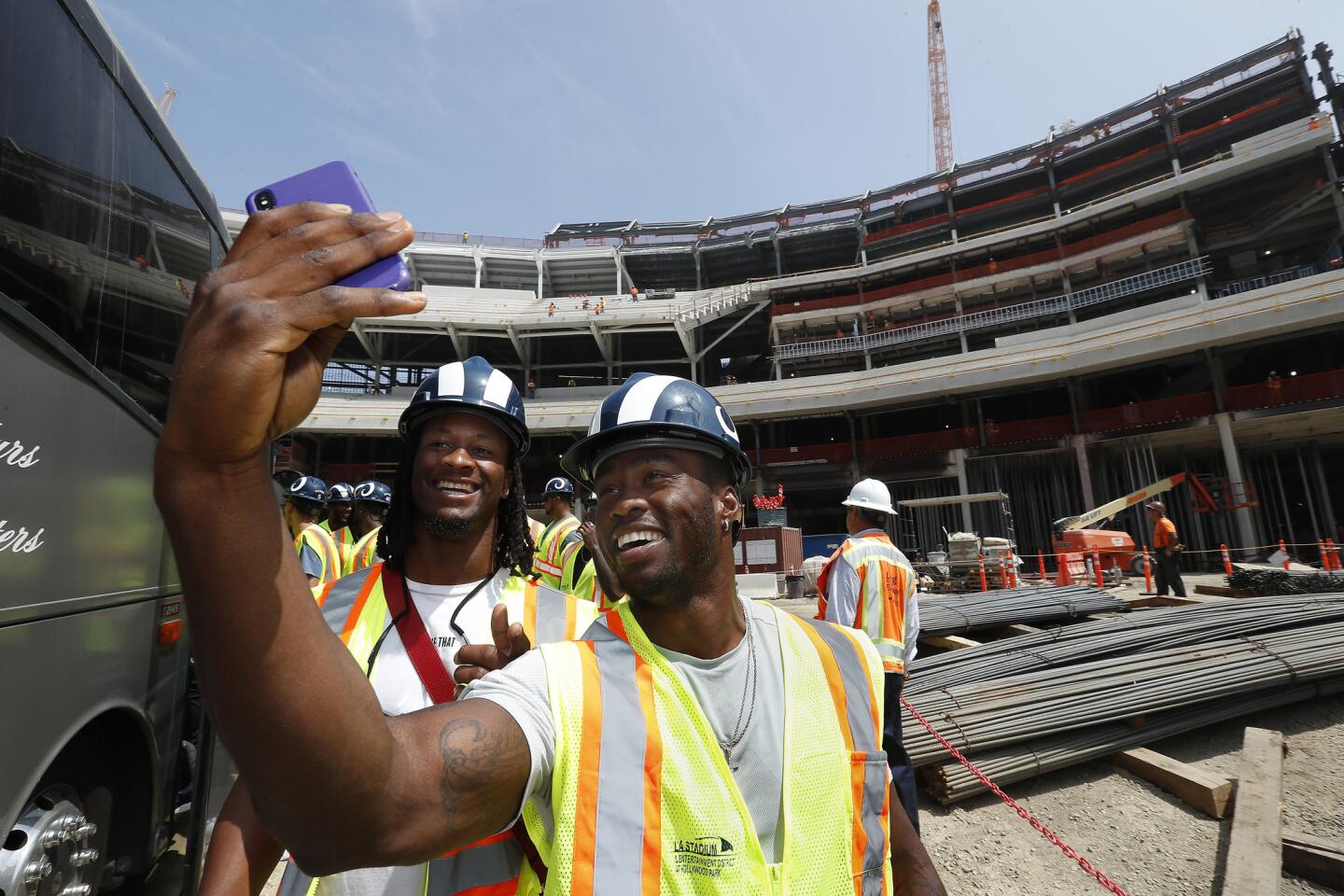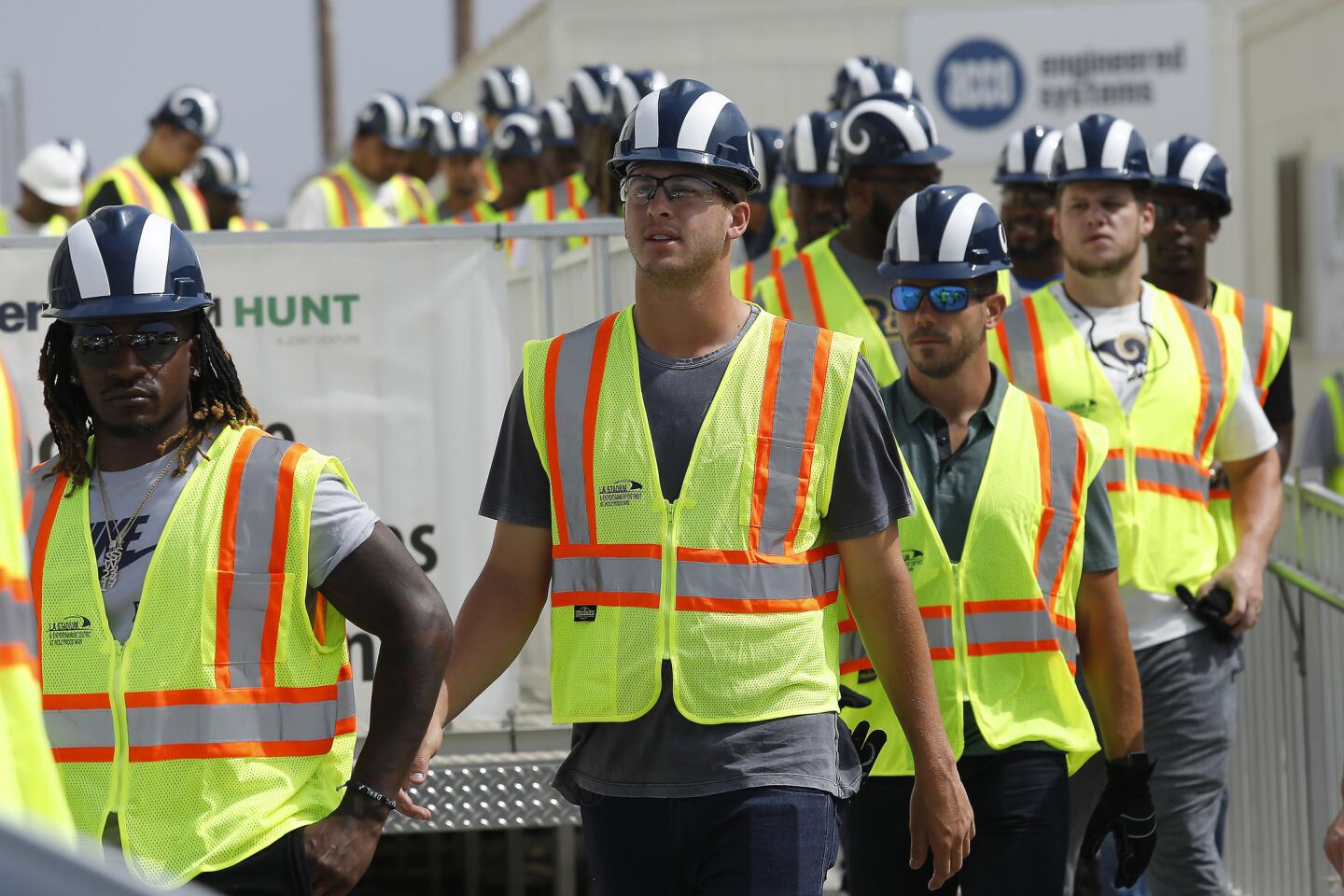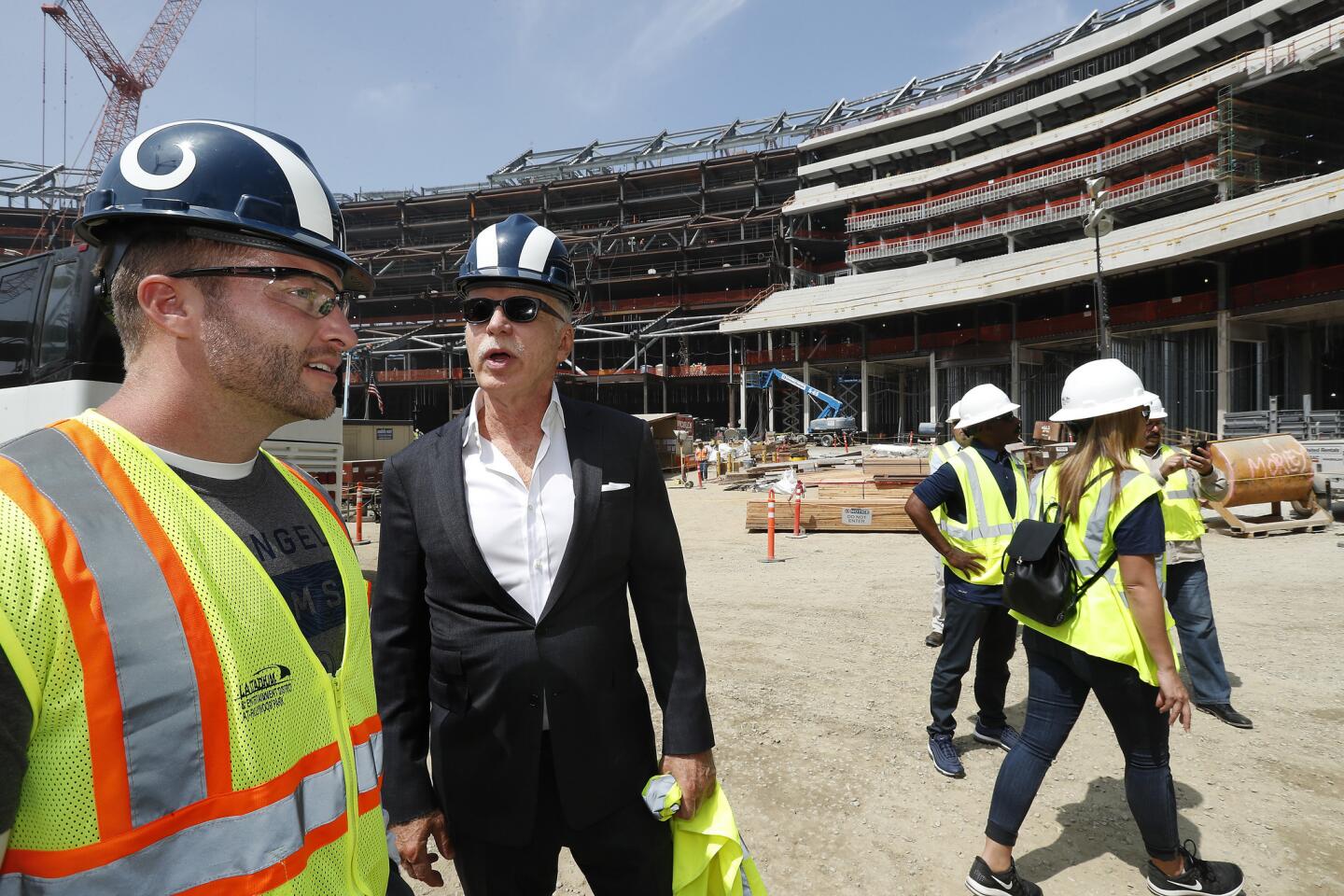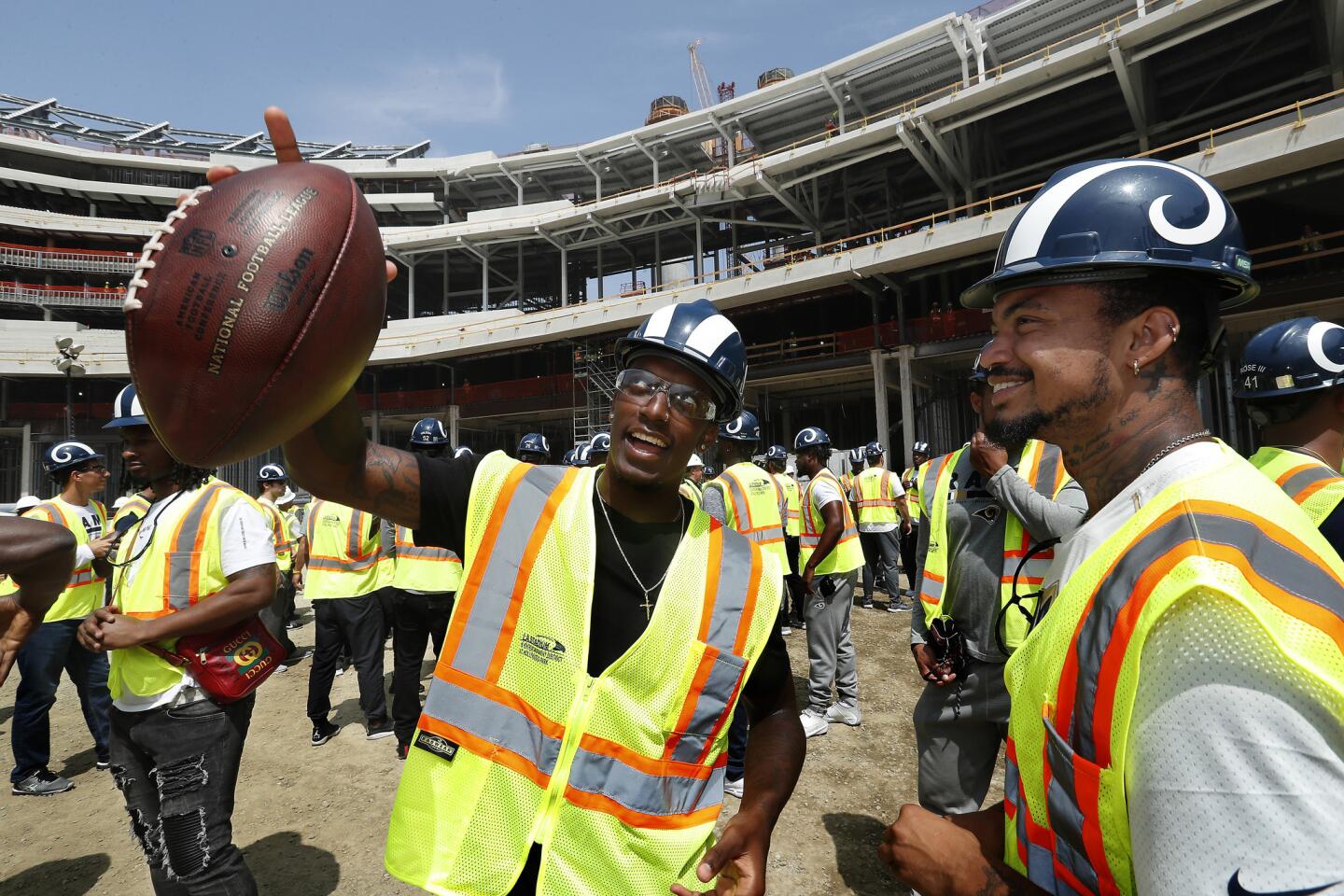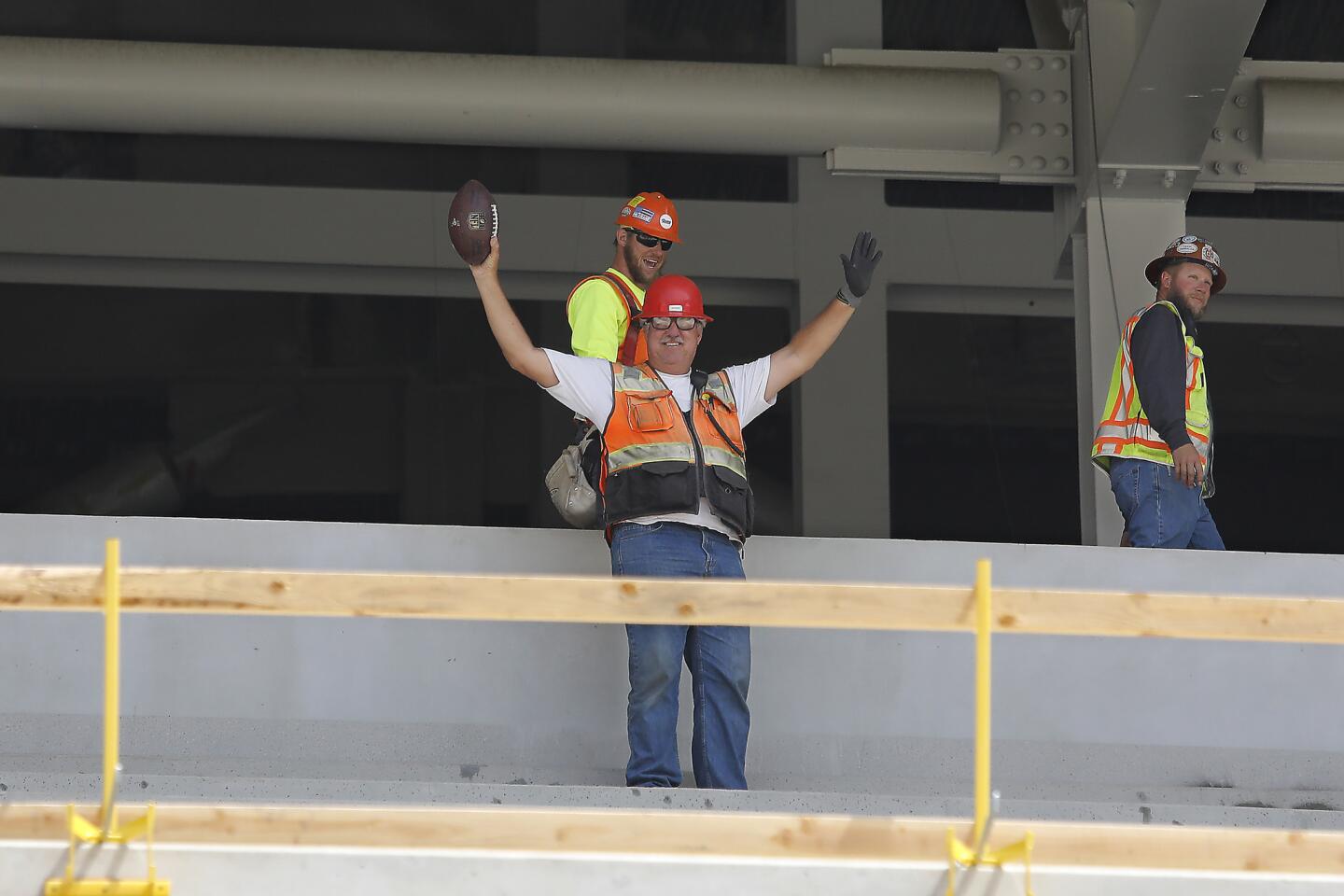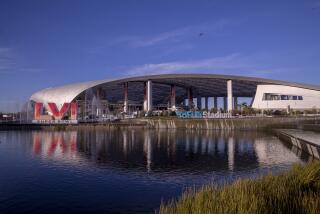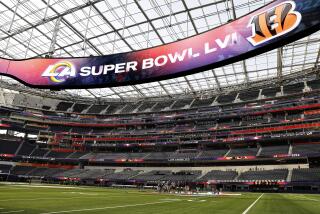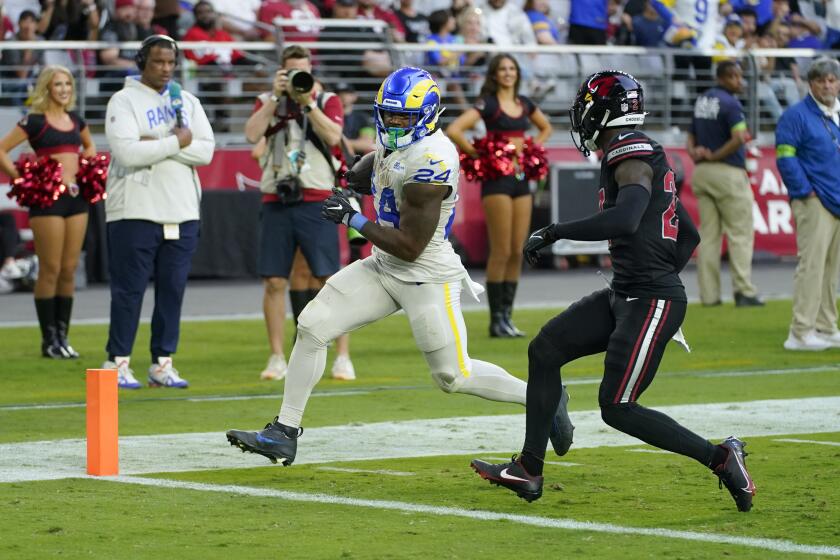SoFi Stadium construction continues amid coronavirus pandemic: ‘Everyone is a little nervous’
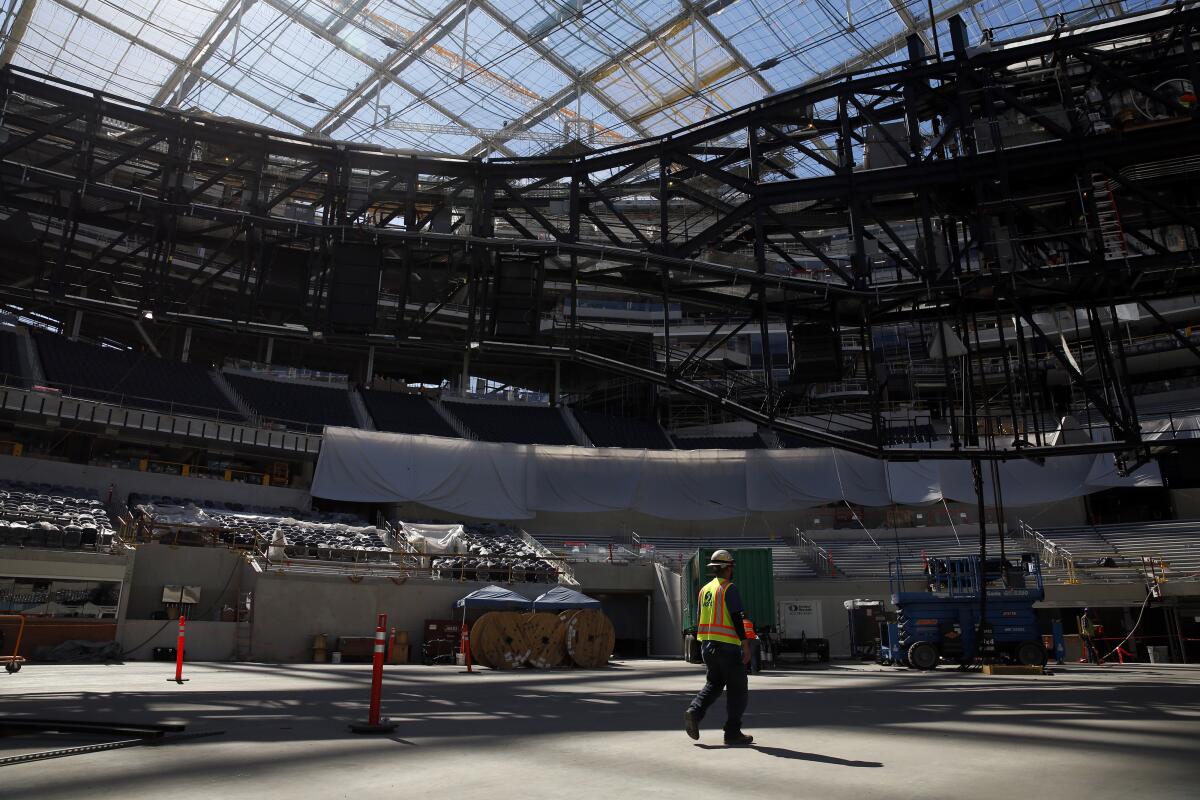
Earth movers crawl over huge mounds of dirt. Dump trucks creep onto Prairie Avenue, bringing traffic to a crawl. Back-up alarms beep and dust swirls as heavy equipment navigates the sprawling site where the gleaming, sail-shaped centerpiece of Inglewood is rising toward completion.
SoFi Stadium, the $5-billion future home of the NFL’s Rams and Chargers, is scheduled to open in late July with a Taylor Swift concert. And nothing, not even the coronavirus outbreak that has staggered entire industries and kept tens of millions of workers across the county at home, is stopping construction.
Over the weekend, an unidentified worker tested positive for COVID-19 and another Monday was said to be “presumed positive.” But an estimated 3,000 people — carpenters, crane operators, electricians, iron workers, painters and tile layers — remain on the job. Some of them, though thankful for the opportunity while unemployment skyrockets, worry that the project could expose them and their families to the virus.
“If our safety was the most important thing, they wouldn’t have us out here,” a tile layer said before getting news of the positives. “Everybody is talking about it. Your focus isn’t 100% on your work. You have that in the back of your head. … We feel like we’re invisible.”
The tile layer was among a half-dozen construction workers who spoke with The Times on the condition they not be identified for fear of retribution. They are conflicted and wonder if they’re putting their health at risk to collect good pay as the economy deteriorates.
SoFi Stadium construction is exempt from Gov. Newsom’s order that all Californians stay home to prevent the spread of the coronavirus, officials said.
“If they want to get the stadium done, they need to provide something to minimize the risk of exposing anyone,” an electrician said. “It doesn’t take much to realize how big this [problem] could be.”
“Everyone is a little nervous,” a second electrician said, “but we need the money.”
It’s a dilemma SoFi workers share with those on projects around the country.
Gov. Gavin Newsom ordered Californians to stay at home to prevent the spread of COVID-19 on March 19, but SoFi and other construction projects are exempt because they’re considered critical infrastructure. Similarly, other state and local governments have allowed construction to continue, labeling it an essential service. In New York, Gov. Andrew Cuomo recently halted most construction because of safety concerns but let work continue on affordable housing, hospital construction and infrastructure projects.
On Sunday night, Los Angeles Mayor Eric Garcetti said his city is sending inspectors to job sites to ensure safety precautions are followed to prevent the spread of COVID-19.
The 298-acre Inglewood project, which broke ground in November 2016, will be the centerpiece of a mixed-use development on the site of the old Hollywood Park racetrack and a critical piece of the city’s transformation into a sports and entertainment hub.
An email Monday notified SoFi workers of the positive test and the presumed positive, saying both people experienced symptoms more than a week ago and were sent home to self-quarantine.
“We are reaching out to you because we suspect others on the Project were in ‘casual contact’ with the individuals in the last 14 days,” the email said. “We are also investigating and implementing supplementary sanitation measures specific to these incidents as necessary.”
The email instructed employees to stay home if feeling ill “for any reason and symptom.”
Turner-AECOM Hunt, the joint venture overseeing SoFi construction, said it has taken steps to keep workers safe, increasing the number of toilets and hand-washing stations, activating toilets inside the stadium, sanitizing field offices each day and having nonessential staff work from home. Workers are told to stay home if they have a cough, fever or difficulty breathing and not to return until they have no signs of illness or fever for 24 hours without the use of medication.
The Rams, whose owner Stan Kroenke is privately financing the project, referred comment to a spokesman for the joint venture.
“The safety of the people on site and in our community remains our top priority,” the spokesman said in a statement.
At SoFi, social distancing is enforced through measures such as barring gatherings of more than 10 people, limiting access to the personnel hoist, suspending or re-sequencing tasks that “require close contact” and mandating workers keep “six feet of separation between each other,” the project spokesman said.
That’s consistent with the state’s approach to the issue. “If folks are going to be performing construction, they are going to need to apply appropriate social distancing, whether it’s less people on the job site or people more spaced apart,” said Brian Ferguson, spokesman for the governor’s Office of Emergency Services.
But some stadium workers said, despite the efforts of management, social distancing wasn’t consistently practiced or enforced. The Times reviewed photos from recent days that showed workers congregating or performing tasks in close quarters.
“It’s impossible to do social distancing and do your job,” the first electrician said. “It’s crazy how some people still don’t take this seriously. I stay away from [colleagues] during lunch time. Look what happened in Italy. … I don’t want that to happen in my community.”
The electrician described a whistling-in-the-gallows joke among coworkers who shout “Corona!” when someone coughs or sneezes.
A fourth electrician described up to eight people filling a lift to go to and from their work station.
“I hold my breath when I pass someone and I take my vitamins,” he said.
A union official working with ironworkers posted on social media several pictures from the site last week.
“Corona Virus be dammed,” the caption read. “We’re working. Essential / Expendable?” He added a note calling it the “most populated jobsite I’ve myself ever been on in my 39 year career.”
In response to the questions about social distancing, the Turner-AECOM Hunt spokesman said supervisors have adopted a zero-tolerance policy for not following the procedures and violations are grounds for dismissal.
“We work extremely hard to create a safe workplace, enforce protocols and protect workers,” the spokesman said. “We actively listen to workers and address any concerns they may have. If they feel uncomfortable, they are free to remain home.”
One electrician who has worked on the project since August summed up the tension he and coworkers feel: “They say don’t come in if you’re sick, but you want to get your paycheck. Here, if you don’t work, you don’t get paid.”
A letter to members by the Pasadena-based International Brotherhood of Electrical Workers Local 11 in mid-March said that because of an agreement between the IBEW International and the National Electrical Contractors Assn., workers denied access to a job site because of COVID-19 may accept a temporary furlough and file for unemployment, and the employer would not contest it.
Inglewood can help solve the first-mile last-mile problem of public transit in a big way.
“Remember,” the letter said, “our jobs are an essential part of the California economy, but your health and that of your family should be your priority.”
The SoFi worker diagnosed with COVID-19 is recovering well, the Turner-AECOM Hunt spokesman said. The worker didn’t enter the stadium, but reported to an “isolated, material pre-assembly area.” Equipment used by the worker was disinfected, his coworkers notified and those in “close contact” are under self-quarantine. The spokesman didn’t immediately respond to a question about whether the quarantined workers are being paid.
“We are fully transparent in our communications with everyone; trades and supervision. This includes any potential or confirmed exposures, daily updates on best practices, government guidelines, directives and listen to and addressing any concerns workers have,” the spokesman said.
The tile layer put it another way.
“You feel if you stop showing up, you’re not going to have a job,” he said. “I feel like my hands are tied. Even though they don’t say they’ll get rid of you, that’s how you feel.”
Times staff writers Andrew Khouri, Gary Klein, Taryn Luna and Alex Wigglesworth contributed to this report.
More to Read
Go beyond the scoreboard
Get the latest on L.A.'s teams in the daily Sports Report newsletter.
You may occasionally receive promotional content from the Los Angeles Times.
